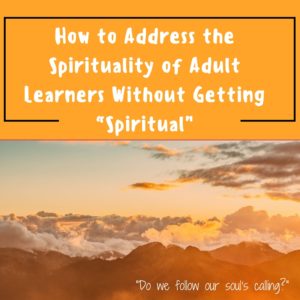 In this series, I’m exploring how #ece professional development is failing teachers.
In this series, I’m exploring how #ece professional development is failing teachers.
In my opinion, our professional development (PD) efforts do not include sufficient attention to supporting teachers’ social-emotional skills, and we need to approach PD from a more wholistic perspective.
In order to support the social-emotional well-being of adult learners, I’ve offered five skills that can be addressed in equal parts during PD, which in the past, has been solely oriented toward compliance, implementation, and change in practice.
This blog post is the last in a six-part series dedicated to identifying strategies that better address the social-emotional health and well-being of adult learners. The five social-emotional skills include:
From my perspective, we are experiencing a time of unprecedented challenges and pressures, which can easily cause us to succumb to empathy fatigue, to suffer from burnout, and to make poor decisions (i.e., make decisions out of fear).
We are witnessing a time unlike any other where we must, on a daily basis, decide, “Do we follow the soul’s calling or do we bend to the forces of deformation around us and within us?” (Parker J. Palmer).
As used here, spirituality is not about beliefs regarding the afterlife, it is not about passing moral judgement, and it is not about issues related to the separation of church and state. Rather, here I discuss spirituality as a skill or ability to connect, to relate, and to make decisions that are grounded in what we know to be the best practice.
Parker J. Palmer (@parkerjpalmer) defines spirituality as, “The eternal human yearning to be connected with something larger than our own egos.” And for me, professional development, whether at the preservice or inservice level, creates an ideal situation for adult learners to become connected. For example, learners can (and should) connect with the instructor/trainer, with other students/participants, and/or with the content.
However, I would argue there are two other connections to be made, both of which are insufficiently addressed by current professional development efforts:
- Connecting with the “calling of one’s own soul,” and
- Connecting with the larger educational system to ensure change.
In an effort to strengthen connections to self and to the context of our vocation (i.e., working in larger educational system), I offer the following definition of spirituality.
The definition is designed to guide efforts to address the wholeness of adult learners by addressing their social-emotional health and well-being.
Spirituality: adult learner connects with self, others, content, and contexts; “casts less shadow and more light“ (Parker Palmer, 1999); works from a place of authenticity; promotes positive change by connecting and collaborating.
One way to support spirituality is through contemplative practices.
Suggestion for PD:
For me, and as it applies to professional development, contemplative practices are any opportunities to explore the complexities and paradoxes of our life and our work. Further, I see contemplative practices as things that: 1) I can incorporate when training groups or coaching individuals, 2) can include movement and invite stillness, and 3) simultaneously promote dialogue and to engage in deep listening.
Contemplative practices promote reflection and inquiry, particularly, self-reflection and self-inquiry.
I discovered a number of examples of a contemplative practice in Stephanie Briggs’ webinar titled “Be. Still. Move: Creative Contemplative Movement.” One that struck me, as doable in my own work in early childhood, was a form of contemplative writing that involves creating visual images. Specifically, learners are asked to “draw” their reflections and/or observations regarding a given statement.
To date, I’ve used this contemplative practice to address the spirituality of PreK teachers in three states. Here is an example of how I designed and implemented the contemplative practice activity.
- Identified five quotes that were related to our work.
- Provided directions via an online learning community space.
- Gave participants three weeks to pick a quote and create a visual image for their reflections and/or observations regarding the selected quote.
- During the f2f event, participants hung their creations around the room where the training was held.
- Participants were encouraged to do a gallery walk of the “creations” and to do so in silence or in quiet tones.
- We then gathered as a large group, and debriefed about what the images resonated with us, and lead to a deeper understanding of our work.
Reference:
Palmer, P. J. (2003). Teaching with heart and soul: Reflections on spirituality in teacher education. Journal of Teacher Education, 54(5), 376-385. doi: 10.1177/0022487103257359
Resources
 P.S. Looking for a resource to support contemplative reflection during your next professional development and learning event or course? Order this adult coloring and contemplative reflection workbook today! Contact me for bulk ordering information.
P.S. Looking for a resource to support contemplative reflection during your next professional development and learning event or course? Order this adult coloring and contemplative reflection workbook today! Contact me for bulk ordering information.
Click here to learn more about the Workbook.
Additional Resources on Adult Social-Emotional Skills:
- The Role of Spirituality in Leadership for Social Change By Maiko Yasuno
- The Center for Courage and Renewal and writings by @ParkerJPalmer
- Should Student Success Include Happiness? Article published by the Greater Good: The Science of Meaningful Life
- The Center for Contemplative Mind in Society, Toward the Integration of Meditation into Higher Education: A Review of Research